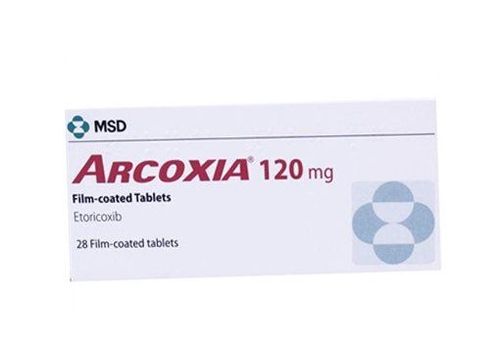1. What are the effects of Etoricoxib 60mg?
Etoricoxib 60 mg is prescribed to treat the following conditions:
- Acute and chronic osteoarthritis;
- Ankylosing spondylitis, rheumatoid arthritis, and acute gout;
- Acute and chronic pain or primary dysmenorrhea (for relieving symptoms).
Of various issues that should be attention when using NSAIDs, the most crucial one is contraindications. Etoricoxib 60mg should not be used in patients with the following problems:
- Hypersensitivity to Etoricoxib or other ingredients of the medication;
- History of bronchial asthma, urticaria, or allergies when using Aspirin and other NSAIDs;
- Congestive heart failure (NYHA class II or higher), uncontrolled hypertension (blood pressure usually above 140/90 mmHg);
- Ischemic heart disease, peripheral arterial disease, and/or cerebrovascular disease (including cases of recent coronary artery bypass grafting or angioplasty);
- Cirrhosis with Child-Pugh score ≥ 10 or serum Albumin below 25 g/L;
- Progressive peptic ulcer or gastrointestinal bleeding;
- Severe progressive kidney disease, Creatinine clearance below 30 mL/min;
It is important to note that Etoricoxib 60 mg must not be combined with other NSAIDs.
2. Dosage and how to use Etoricoxib 60 mg
Patients should only use Etoricoxib 60 mg under a doctor’s supervision. It is important not to buy the medication without a doctor’s permission. Etoricoxib 60 mg is taken orally once a day, before or after meals.
Note that patients should adhere to the doctor's instructions, do not take the exceeded dose of Etoricoxib 60 mg. Patients should maintain the lowest effective dose of Etoricoxib 60 mg for the shortest period due to the risk of myocardial infarction and stroke.
The recommended dosage of Etoricoxib 60 mg is as follows:
- Symptomatic treatment of osteoarthritis (including arthritis degeneration): The initial dose is 30 mg (1⁄2 tablet of Etoricoxib 60 mg). The maximum dose is 60 mg taken once daily;
- Rheumatoid arthritis, ankylosing spondylitis: The maximum dose is 90 mg (1.5 tablets of Etoricoxib 60 mg) taken once daily;
- Moderate pain after dental procedures: The maximum dose does not exceed 90 mg/day, taken once for a maximum 3-day period;
- Acute gout: The dose of Etoricoxib 60 mg is not more than 2 tablets per day, for a maximum 8-day period;
- Acute pain or primary dysmenorrhea: The dose of Etoricoxib 60 mg does not exceed 2 tablets per day, for a maximum 8-day period.
Dosages in some special cases:
- There is no need to adjust the dose due to age, gender, and race;
- Hepatic impairment:
- Patients with Child-Pugh scores 5-6 should not use more than 60 mg (1 tablet of Etoricoxib 60 mg) per day,
- Patients with Child-Pugh scores 7-9 should reduce the dose, take no more than 1 tablet of Etoricoxib 60 mg in 2 days, or use 30 mg once a day, instead;
- Renal impairment with Creatinine clearance ≥ 30mL/min: no dose adjustment needed.
3. Side effects of Etoricoxib
Like other medications, Etoricoxib 60mg can cause several side effects in distinct frequencies and risks depending on each condition. If experiencing any of the following symptoms, the patients should stop using Etoricoxib 60mg and see the doctor immediately:
- Shortness of breath;
- Chest pain;
- New or worsening ankle swelling;
- Jaundice, yellowing of the eyes: These are signs of liver disease;
- Severe or persistent stomach pain or black stools (suggesting gastrointestinal bleeding);
- Some manifestations of allergic skin reactions such as ulcers, blisters, or swelling of the face, lips, tongue, or throat along with difficulty breathing
The above side effects of Etoricoxib 60 mg are not common. Besides, there may be some symptoms not reported on the list. If users have any questions about side effects, please contact the doctor or pharmacist.
4. Notes when using Etoricoxib 60mg
Before using Etoricoxib 60mg, patients should inform their doctor of the following issues:
- History of allergies when using non-steroidal anti-inflammatory drugs (NSAIDs), including Aspirin and COX-2 inhibitors;
- History or current symptoms of gastric ulcers or gastrointestinal bleeding;
- History of serious liver or kidney disease;
- Pregnant or breastfeeding;
- Under 16 years old;
- History of intestinal inflammation, such as Crohn's disease, ulcerative colitis, or duodenitis;
- History of cardiovascular disease, hypertension, or stroke.
Because cardiovascular risk increases with dose and duration of use, patients should use NSAIDs that selectively inhibit COX-2 (including Etoricoxib 60 mg) for the shortest period at the lowest effective dose. Note that selectively inhibiting COX-2 NSAIDs cannot replace Aspirin in the prevention of cardiovascular events because they do not have an antiplatelet effect.
Patients with present cardiovascular risks should use Etoricoxib 60 mg with caution. These conditions include hypertension, hyperlipidemia, diabetes, regular smoking, or taking acetylsalicylic acid. Those are significant dehydration, those who have a history of perforation or ulcers or gastrointestinal bleeding, those over 65 years old, and those who have had previous asthma attacks, urticaria, or rhinitis due to sensitivity to Aspirin or non-selective cyclooxygenase inhibitors should cautiously use Etoricoxib 60 mg.
Edema, fluid retention, and hypertension should be monitored in patients who have a history of hypertension and heart failure when taking Etoricoxib 60mg. Renal function should also be monitored periodically in patients with impaired renal function, decompensated heart failure, or significant cirrhosis.
Patients who are pregnant in the first 6 months may consider taking Etoricoxib 60mg if the therapeutic benefits outweigh the risks to the fetus. In addition, breastfeeding women should consider stopping either the medication or breastfeeding based on a risk-benefit comparison.
5. Drug interactions of Etoricoxib 60mg
Exercise cautiously when combining Etoricoxib 60mg as it may interact with the following medications:
- Anticoagulants such as warfarin;
- Rifampicin antibiotics;
- Methotrexate (an immunosuppressant commonly used in the treatment of rheumatoid arthritis);
- Angiotensin-converting enzyme inhibitors and Angiotensin II receptor blockers for treating hypertension and heart failure medications, such as Enalapril, Ramipril, Losartan, and Valsartan;
- Lithium;
- Diuretics;
- Cyclosporin or Tacrolimus (anti-rejection drugs);
- Digoxin;
- Minoxidil;
- Salbutamol in tablet or oral solution form;
- Oral contraceptives.
Above is basic information about the uses, dosage, and precautions when using Etoricoxib 60mg. Due to potentially dangerous side effects on the cardiovascular system of the medication, patients should consult a doctor or pharmacist before using it.
To arrange an appointment, please call HOTLINE or make your reservation directly HERE. You may also download the MyVinmec app to schedule appointments faster and manage your reservations more conveniently.
To arrange an appointment, please call HOTLINE or make your reservation directly HERE. You may also download the MyVinmec app to schedule appointments faster and manage your reservations more conveniently.








